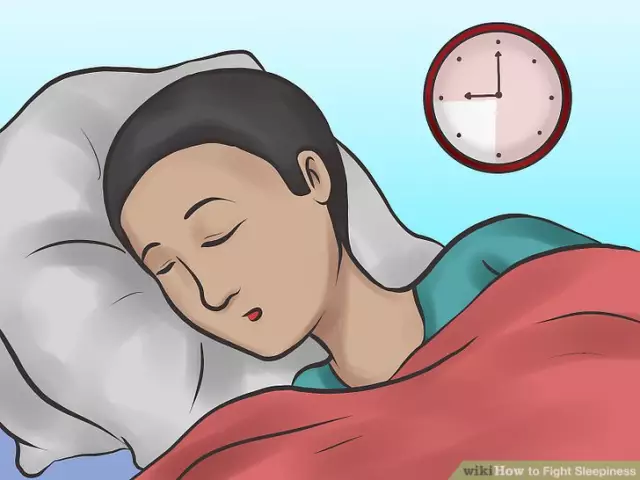- Author Rachel Wainwright wainwright@abchealthonline.com.
- Public 2023-12-15 07:39.
- Last modified 2025-11-02 20:14.
8 causes of sleepiness and how to fight them
The state of sleepiness is familiar to everyone. It is characterized by a whole complex of unpleasant sensations: a person becomes lethargic, has a strong desire to lie down, his reactions slow down, and apathy appears. This can be observed at any time of the day, including at the moment when everyday affairs await us. People who are constantly suffering from sleepiness become irritable and non-contact, their physical and intellectual activity decreases.
In such a situation, the malaise cannot be ignored - it is necessary to find out its cause and determine ways to solve the problem. Today we will introduce our readers to the most common factors causing drowsiness.

Source: depositphotos.com
Fatigue
Drowsiness due to fatigue occurs in the late afternoon, after strenuous daytime activities. This is a normal condition that goes away after a night's sleep.
To get enough sleep, you need to follow a few rules:
- the room for night rest should be well ventilated;
- in the bedroom, you cannot turn on a bright light, leave the TV or computer monitor on;
- the room should be quiet;
- bed linen, sleepwear (nightgown, pajamas) and all textile accessories in the bedroom must be made of soft natural fabrics;
- a sofa or bed (mattress) intended for a night's rest must be chosen in accordance with the anatomical features of the body of the person who will use them;
- it is important to go to bed no later than midnight. The duration of night rest, ensuring the restoration of physical and mental activity, for most people is 7-8 hours.
Stress
Some people develop sleep disturbances against the background of stress: at night a person suffers from insomnia, and during the day he is overcome by drowsiness. Insomnia due to stress may require the help of a psychotherapist and anti-anxiety medications. Of course, the type of medicine and the regimen of its administration must be determined by the doctor. Self-medication in such a situation is fraught with aggravation of the problem and other serious complications.
Disease
The cause of drowsiness is often a pathological process in the body. Fatigue and lethargy during the day cause the following illnesses:
- diabetes;
- disruption of the endocrine glands. Especially drowsiness is characteristic of malfunctioning of the endocrine system, accompanied by obesity (Pickwick syndrome);
- heart disease;
- instability of blood pressure (drowsiness can be a sign of both hypertension and hypotension);
- Iron-deficiency anemia;
- liver pathology;
- impaired renal function;
- stomach and intestinal problems;
- inflammatory processes;
- viral infections;
- the development of malignant neoplasms;
- neuroses and depressive states.
Drowsiness almost always occurs with traumatic brain injury and poisoning. Situations characterized by increasing hypoxia of the brain are especially dangerous: in these cases, drowsiness is a sign of the development of a coma.
Taking medications
Drowsiness can be caused by medication:
- tranquilizers and antipsychotics;
- antihistamines;
- some antitussive drugs;
- analgesics;
- lowering blood pressure;
- used to treat heart disease;
- used in the treatment of gastric ulcer;
- antibiotics;
- hormonal contraceptives.
The intensity of side effects of this kind is very individual: in some patients, drowsiness when taking medications is almost not manifested, while others constantly complain of lethargy and loss of strength.
Immobility
People who are forced to sit constantly while working often feel sleepy during the day. This can be explained by stagnation: in the absence of physical activity, blood flow in the vessels slows down, the brain begins to suffer from a lack of oxygen and nutrients.
The way to solve the problem in this case is obvious: you need to do a warm-up from time to time. You need to leave the workplace at least once during an hour, walk, do exercises for the arms, neck and legs. Usually, a few movements are enough for drowsiness to disappear and lethargy give way to vigor.
It is important for office workers to make up for the lack of movement by playing sports in their free time. In this sense, cycling, running or brisk walking, swimming are the best choices. In winter, cross-country skiing and outdoor family games are beneficial.
Avitaminosis
Vitamin deficiency is bad for your overall health. It can cause daytime sleepiness, among other symptoms. Most often, this is the lack of vitamins C, E, B6 and B12. As a rule, discomfort occurs in the autumn-winter period, when the amount of vegetables and fruits consumed decreases.
If there are no problems associated with the absorption of vitamins, then pharmaceutical preparations are not required. Seasonal vitamin deficiency can be easily corrected by adding seafood, liver, nuts and legumes to the daily diet, as well as increasing the proportion of fruits and berries rich in vitamin C: black currants, citrus fruits, kiwi, rose hips, etc.
Failure of biorhythms
Daytime sleepiness can be caused by disruptions in the rhythm of life due to work needs. This is often the case with people who have to periodically work in the evening and night shifts. A similar condition occurs when a person moves to a different time zone or to an area with unusual climatic conditions. A healthy body rebuilds rather quickly and discomfort disappears by itself. But in the presence of diseases, the process can take quite a long time. In some cases, it is not possible to adapt to changes at all, and people have to return to their familiar environment, refusing to implement their plans.

Source: depositphotos.com
Wrong indoor climate
The intensity of the brain depends on the quality of the air breathed in by a person. Too low humidity, insufficient oxygen content, high temperature cause hypoxia and drowsiness. Problems can arise from excess tobacco smoke in the air or the presence of strong odors (for example, the aromas of some flowers or perfumes). Therefore, it is so important to regularly ventilate living and industrial premises, to maintain optimal temperature and humidity in them.
Persistent drowsiness is a dangerous symptom, especially if it is accompanied by dizziness, headache, nausea, lack of appetite, swelling, and soreness. In this case, an urgent visit to a doctor is required.
YouTube video related to the article:

Maria Kulkes Medical journalist About the author
Education: First Moscow State Medical University named after I. M. Sechenov, specialty "General Medicine".
Found a mistake in the text? Select it and press Ctrl + Enter.






